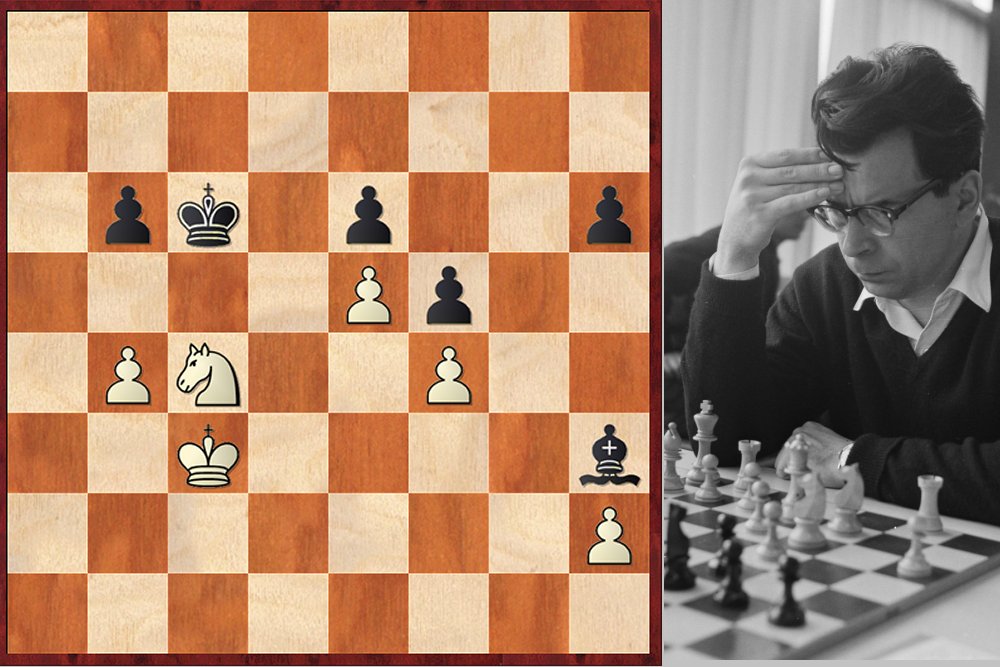


The duel "bishop against knight" is tricky and often leads to long manoeuvring. At the Candidates Tournament 1962 in Curacao Pal Benko had such an endgame against Viktor Kortschnoi.
Karsten Müller asked the readers to help analysing this endgame.

Pal Benko
In fact, Benko missed a deep and hidden win.
Usually, the bishop strives for dynamic play while the knight prefers more static positions. In this case, after 46...h3, Benko's knight has everything under control and all the time in the world. However, it still takes some time before it is apparent how White can win.
Kevin Cotreau and Scorpion29 found correct solutions.
Zoran Petronijevic once again sent in the best solution.
Our reader Ted Jewell wanted to know more about Zoran Petronijevic, who again and again provided the best solutions to Karsten Müller's Endgame Riddles, and he invited Zoran to an interview to gain insights into his analytical methods:
Are you a strong player? Do you have a FIDE-rating or a title?
I am an International Master with a current rating of 2405. However, in 2003 I have stopped to play over-the-board chess. By profession I am a teacher for philosophy and logic, but currently I am unemployed.
Since 2003 I have worked as a chess coach online and that makes me happy. Occasionally, I play some blitz chess on sites such as playchess.com, ICC, chess.com, lichess.... My handle is "zoranp".
In chess I try to find the truth, or at least, to come closer to it. I regularly analyse games for the Chess Informant where I have a small column about endgame errors. A long time ago, I also made a CD for ChessBase about Caro-Kann. Moreover, I edited and revised two parts (pawn endings and rook endings) of the Encyclopedia of Chess Endings which is published by Chess Informant.
Which engines do you use? How long do you let the computer run on a particular line? How deeply do you go into a line before ending the search and moving to another variation?
I use Stockfish 11 – usually the latest version. Before I let an engine analyse a game, I analyse myself on the board to try to find the most important ideas. How deep we should analyse with an engine depends on the complexity of the position. We should know in which positions the engine can help us, and in which positions it is helpless (or almost helpless). In sum: if we want to find the best moves, we need to have an understanding of chess.
Do you do much of the analysis yourself? Or do you let the computer analyze various branches and then assemble the results?
I always analyze on the board first, and only afterwards with an engine. I steer the engine through the variations – not the other way round – particularly in positions, in which the engines are not that strong. In positions, in which there is no clear plan (or in which there is a deep, hidden plan) the engines are not particularly useful. In fact, analysing on the board without the help of engines is one of my passions.
Do you research all published analysis of the game, which you want to analyse, first? Do you do anything in particular before using an engine?
If the game is well-known, yes. One should know where previous analysts stopped. Of course, you should check their analyses before you go deeper into the position. E.g., the last riddle that was published on the ChessBase website (Schlechter-Lasker) has been heavily analysed and there were a lot of important analyses one should simply know and check. I therefore own a decent number of chess books (about 2,000).
Tu sum it up again: to analyse well, you have to know something about chess. Engines do not understand some typical positions, some well-known endgame ideas, fortresses, etc... But you should know this. Because I no longer play tournament chess, I hardly ever analyse openings. I mainly analyse middlegames and endgames.
Thank you for your time and insights!